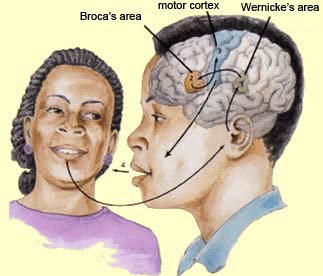There are times when I read journal articles, and truly begin to question whether I have a language comprehension deficit.
It's times like this when I feel like someone who has receptive aphasia (a deficit in understanding language), thus allowing me to empathize more when I see or hear of anyone with receptive aphasia and think to myself... "Ahh.... I feel like that sometimes, it's just that they feel like that ALL the time".
I know sometimes people might not understand how someone can lose their ability to understand spoken or written language after a stroke? How can you possibly lose something which you have spent your entire life using? It's almost as baffling as amnesia right? (Well, at least the selective amnesias we always get to see in melodramas or movies like The Promise/Vow or whatever it was called)
But the next time you meet someone who has had a brain injury, or dementia, or stroke or whatever, think of it as something like this:
Imagine an instance when suddenly, all the people around you are speaking French/Swahili/German or whatever unknown tribal language. You may or may not have a rough idea of that language (e.g. German has similar syntaxt to English), and you might or might not be able to say all the sounds in the language (such as the clicks or trills in some tribal languages). Because more often than not, someone who has had a stroke with impacted language, might also have some difficulties in actually moving their mouths, tongues and teeth and coordinating them to form the word, despite having that word in their head.
Can you imagine the frustration?? Knowing that you were once able to talk and write and understand, and suddenly, it's all a foreign language to you.
I really do feel a bit like that when I read those scienc-ey journal articles on neurotransmitters, brain regions, substrates and what not (Ihavenoideawhatiamsaying)
Peace out
It's times like this when I feel like someone who has receptive aphasia (a deficit in understanding language), thus allowing me to empathize more when I see or hear of anyone with receptive aphasia and think to myself... "Ahh.... I feel like that sometimes, it's just that they feel like that ALL the time".
 |
| The two main language areas: Broca's and Wenicke's |
I know sometimes people might not understand how someone can lose their ability to understand spoken or written language after a stroke? How can you possibly lose something which you have spent your entire life using? It's almost as baffling as amnesia right? (Well, at least the selective amnesias we always get to see in melodramas or movies like The Promise/Vow or whatever it was called)
But the next time you meet someone who has had a brain injury, or dementia, or stroke or whatever, think of it as something like this:
Imagine an instance when suddenly, all the people around you are speaking French/Swahili/German or whatever unknown tribal language. You may or may not have a rough idea of that language (e.g. German has similar syntaxt to English), and you might or might not be able to say all the sounds in the language (such as the clicks or trills in some tribal languages). Because more often than not, someone who has had a stroke with impacted language, might also have some difficulties in actually moving their mouths, tongues and teeth and coordinating them to form the word, despite having that word in their head.
 |
| What it feels like to have aphasia |
I really do feel a bit like that when I read those scienc-ey journal articles on neurotransmitters, brain regions, substrates and what not (Ihavenoideawhatiamsaying)
Peace out


